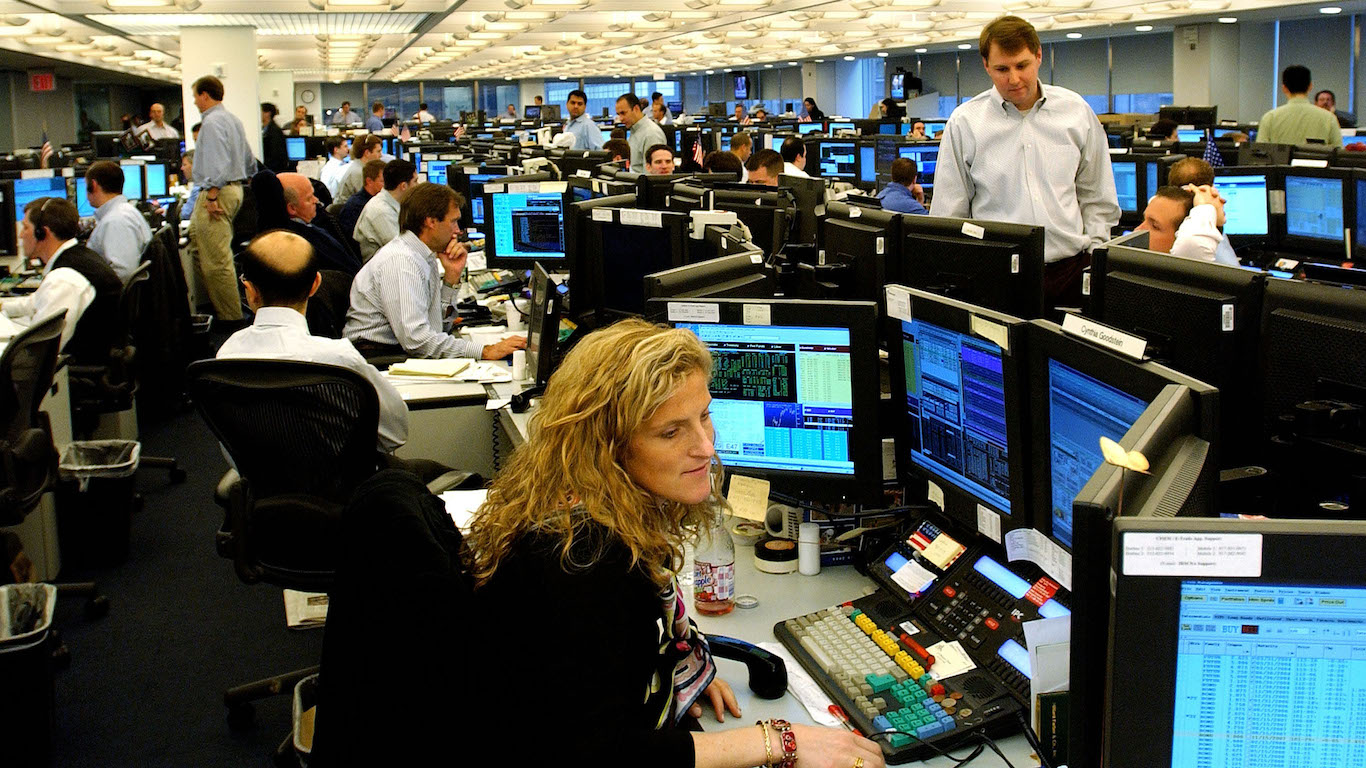
The U.S. financial sector is at the very heart of this nation’s economy. Through these financial institutions, businesses at all levels are able to function and consumers can affordably have their wealth protected. This sector is truly an integral part of the economy; without it, the country would break down.
While the financial sector is broad, there are a few key types of businesses that we are focusing on. The first is banks, which provide a variety of services to businesses and consumers, primarily loans, transfers and deposits. Brokerage firms advise investors and connect them to the markets. And insurance companies cover customers for damages. Some of the companies that we have listed provide several, if not all, of these services.
The financial crisis that occurred a decade ago offered further proof that U.S. financial institutions are at the heart of the U.S.—if not global—economy. In the simplest of terms, banks were overzealous in their lending in the U.S. subprime mortgage market, which snowballed into a full-blown international banking crisis. This sector was in near ruin, with the investment bank Lehman Brothers collapsing and many other financial institutions requiring a government bailout.
Now there are more rules, regulations and oversight to keep these financial institutions’ lending in line to ensure that we never see a similar crisis again. In fact, the U.S. Federal Reserve recently said that most banks passed their annual Dodd-Frank Act Stress Tests, which assess their ability to survive an array of economic crises.
Yet the current administration is rolling back some of these one-size-fits-all regulations, which some bankers consider onerous. Many smaller banks have struggled with the costs and restrictions on lending that Dodd-Frank imposed. Now, the most stringent restrictions will only be applicable to the largest banks, but these are the ones with enough capital to manage. More banks will breathe easier going forward, and they could be more profitable as well.
In the most recent Federal Open Market Committee (FOMC) meeting, the Fed decided to raise short-term interest rates by 25 basis points to between 1.75% and 2.00%. However, that wasn’t all. The Fed also plans to have two more rate hikes in the remaining six months of 2018. Generally speaking, this is pretty good news for banks.
Rising interest rates allow banks, insurance companies and brokerage firms—basically any institution with massive cash holdings—to increase the yield on their cash, with the proceeds going directly to earnings.
Recent breaches of trust by some major banks have left consumers wary about where to put their money, and the concerns are very real. The rise in popularity of credit unions could provide some competition to banks.
While banks and other financial institutions still must answer to their customers, their outlook is very sunny, all things considered.
24/7 Wall St. ordered its list of major financial companies by market cap as of June 21, 2018. Also included are the companies’ most recent fiscal year revenues, net income and number of employees.
Click here to see the 12 companies that control American finance.

12. American Express Co.
>Market Cap: $83.14 billion
>Revenue: $33.47 billion
>Net Income: $2.74 billion
>Employees: approximately 55,000
American Express provides charge and credit card products and travel-related services to consumers and businesses worldwide. This stock has bounced back nicely from the intense selling earlier this year. The company’s offerings also include payments and expense management products and services; consumer and business travel services; stored value products, such as traveler’s checks; and network services.
[in-text-ad]
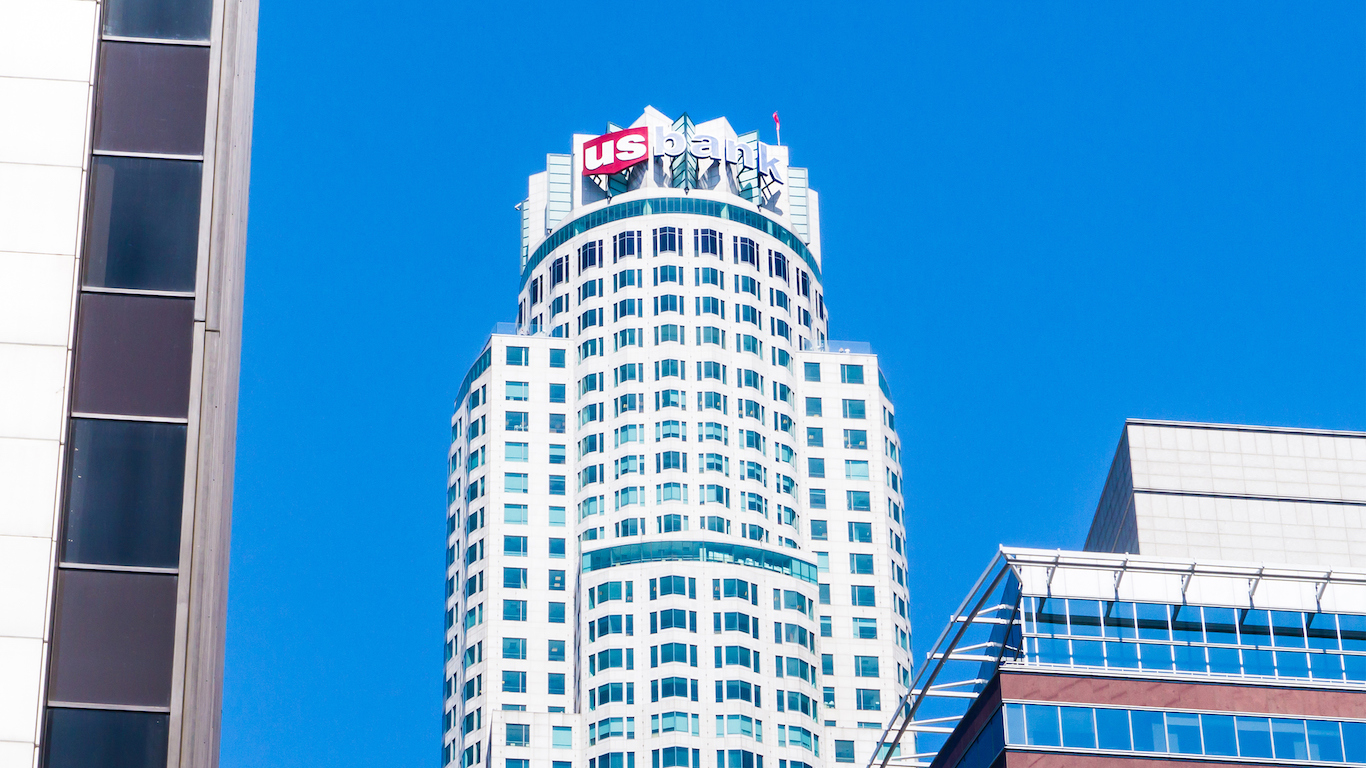
11. U.S. Bancorp
>Market Cap: $83.75 billion
>Revenue: $22.06 billion
>Net Income: $6.22 billion
>Employees: approximately 72,400
U.S. Bancorp is the parent company of U.S. Bank, the fifth largest commercial bank in the United States and fourth largest by number of branches. The firm offers a comprehensive line of banking, investment, brokerage, trust and mortgage services to consumers, businesses and institutions. Many on Wall Street like the fact that U.S. Bancorp has no meaningful capital markets exposure and has among the best risk management/credit profile in the industry, and generates among the highest returns of its peers. Fee income represents a whopping 45% of total revenue, spread over four separate business segments, providing a strong overall base. The diversity of business lines/revenue streams is expected to drive strong through-the-cycle performance.

10. Goldman Sachs Group
>Market Cap: $85.73 billion
>Revenue: $32.07 billion
>Net Income: $4.29 billion
>Employees: approximately 37,300
This continues to be the gold standard of Wall Street banks. Goldman Sachs has a gigantic institutional equity, debt and derivatives business; an ultra-high net worth clientele; and top investment banking and capital markets expertise. The firm continues to be a dominant force around the world, one of the most sought-after banks and one of the very few firms that dictate who can be a client. Not only is it a dominant force in that sense, but it also drives the Dow Jones Industrials as the third heaviest weighted stock in the index.
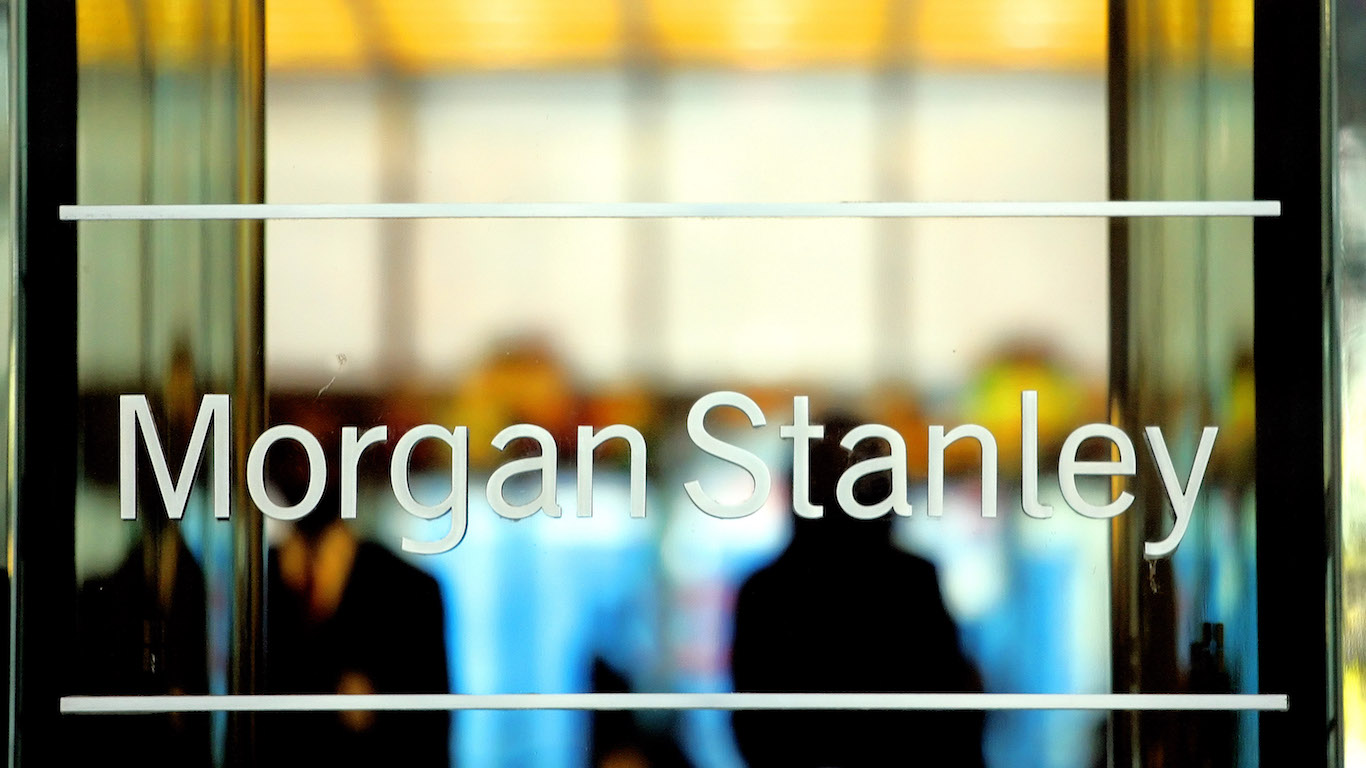
9. Morgan Stanley
>Market Cap: $88.14 billion
>Revenue: $37.95 billion
>Net Income: $6.11 billion
>Employees: approximately 57,800
This is another of Wall Street’s elite, and it may be among the best buys in the banking and investment arena. Morgan Stanley is a global investment bank with leading positions in investment banking (M&A and equity underwriting), equity trading and wealth management, which contributes nearly 50% of firmwide revenues. The firm also has an asset management business, which adds to the lower-risk business profile the firm has pursued since the financial crisis.
[in-text-ad-2]

8. PayPal Holdings, Inc.
>Market Cap: $102.08 billion
>Revenue: $13.09 billion
>Net Income: $1.80 billion
>Employees: approximately 18,700
PayPal is a global, technology-driven payment platform with more than 210 million direct customer relationships in more than 200 countries. The stock was hit when the company announced a restructuring of its agreement with eBay back in January; it will become merchant of record after the current deal expires in 2020. However, eBay will continue to accept PayPal-branded transactions through 2023. Currently, PayPal is accepted at more than 75% of the largest 100 internet retailers. It enables businesses of various sizes to accept payments from merchant websites, mobile devices and applications, as well as at offline retail locations through a range of payment solutions across company’s payments platform, including PayPal, PayPal Credit, Venmo and Braintree products.

7. Citigroup Inc.
>Market Cap: $172.45 billion
>Revenue: $71.5 billion
>Net Income: $15.8 billion
>Employees: approximately 209,000
Citigroup may be the smallest of the four major money center banks, but don’t let this fool you. Citigroup has the only positive price-to-book value ratio in the group, meaning that the stock could be undervalued. This bank has approximately 200 million customer accounts and does business in more than 160 countries and jurisdictions. It provides consumers, corporations, governments and institutions with a broad range of financial products and services, including consumer banking and credit, corporate and investment banking, securities brokerage, transaction services and wealth management.
[in-text-ad]

6. Mastercard Inc.
>Market Cap: $209.61 billion
>Revenue: $12.50 billion
>Net Income: $3.92 billion
>Employees: approximately 13,400
This company continues to be one of the top credit card players in the world. MasterCard claims to have the world’s fastest payments processing network, connecting consumers, financial institutions, merchants, governments and businesses in more than 210 countries and territories. MasterCard’s products and solutions make everyday commerce activities such as shopping, traveling, running a business and managing finances easier, more secure and more efficient.

5. Wells Fargo & Co.
>Market Cap: $264.94 billion
>Revenue: $88.39 billion
>Net Income: $22.18 billion
>Employees: approximately 265,700
This large cap bank is a solid value play for 2018, but it still faces the possibility of large fines from its illegal cross-selling practices in years past, among other things. Wells Fargo is a nationwide, diversified, community-based financial services company with $1.8 trillion in assets. It provides banking, insurance, and investment services, and mortgage, consumer and commercial finance through 8,700 locations, 12,800 ATMs, the internet and mobile banking. I has offices in 36 countries to support customers who conduct business in the global economy. Wells Fargo serves one in three households in the United States. It has slowly, but surely, become one of the biggest mortgage lending companies in the country, in addition to its normal banking and brokerage businesses.

4. Bank of America Corp.
>Market Cap: $296.98 billion
>Revenue: $87.35 billion
>Net Income: $18.23 billion
>Employees: approximately 208,000
Bank of America is a ubiquitous presence in the United States, providing various banking and financial products and services for individual consumers, small and middle-market businesses, institutional investors, corporations and governments in the United States and internationally. Bank of America operates some 5,100 banking centers, 16,300 ATMs, call centers, online and mobile banking platforms, and said earlier this year it plans to open 500 new branches.
[in-text-ad-2]

3. Visa Inc. (NYSE: V)
>Market Cap: $301.32 billion
>Revenue: $18.36 billion
>Net Income: $6.70 billion
>Employees: approximately 15,000
This top credit card issuer is becoming a huge leader in digital payments. Visa operates the world’s largest retail electronic payments network. The company provides processing services and payment product platforms, including consumer credit, debit, prepaid and commercial payments, offered under Visa and related brands. According to Nilson estimates, the company is the largest global credit network (as measured by volume) and the second largest global debit network. Visa is not a bank and does not issue cards, extend credit or set rates and fees for consumers. Visa’s innovations, however, enable financial institution customers to offer consumers more choices.
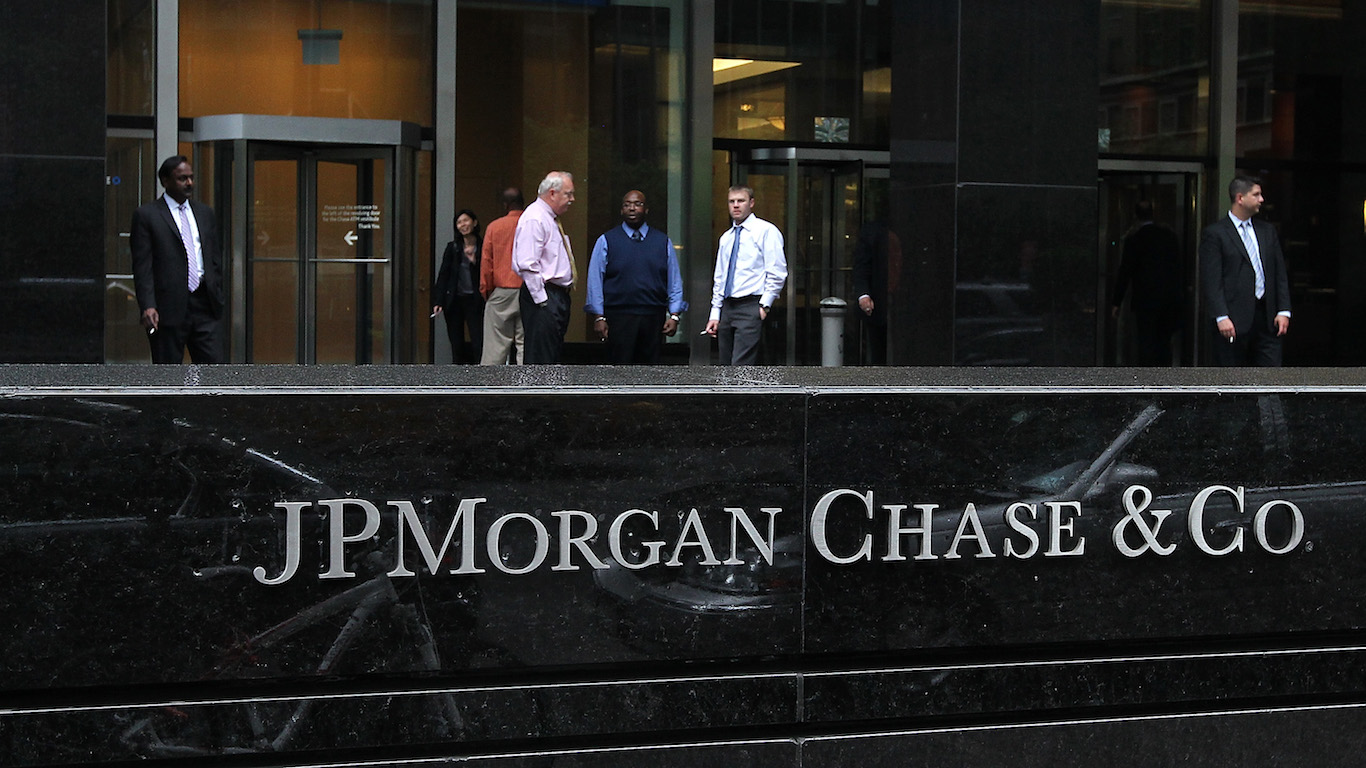
2. JPMorgan Chase & Co.
>Market Cap: $366.00 billion
>Revenue: $99.62 billion
>Net Income: $24.44 billion
>Employees: approximately 253,700
JPMorgan is a leading global financial services firm and one of the largest banking institutions in the United States, with about $2.6 trillion in assets. The bank is known for its ironclad balance sheet and perhaps the savviest CEO in the industry, Jamie Dimon. The company was formed through the merger of retail bank Chase Manhattan and investment bank JPMorgan. The firm now has many operating divisions, including investment and corporate banking, asset management, retail financial services, commercial banking, credit cards and financial transaction services.
[in-text-ad]
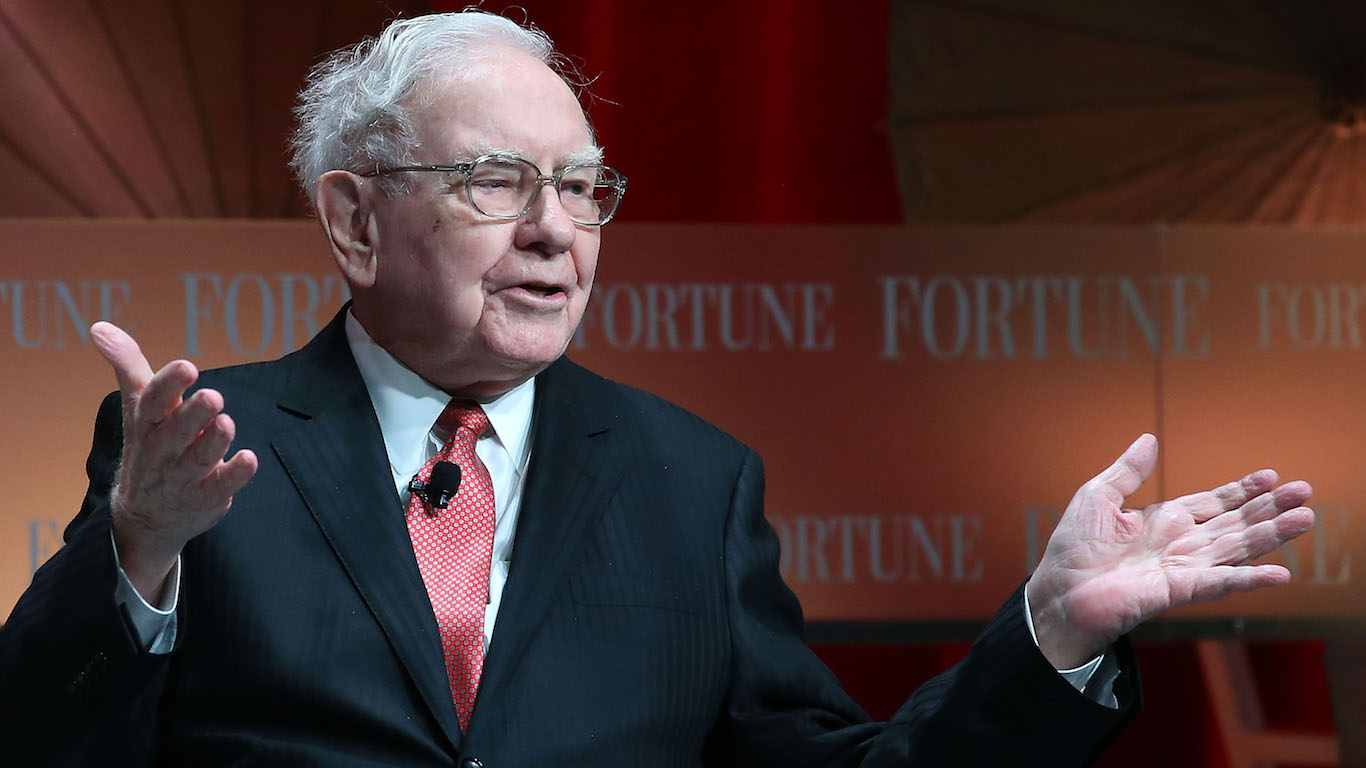
1. Berkshire Hathaway Inc.
>Market Cap: $468.85 billion
>Revenue: $242.14 billion
>Net Income: $44.94 billion
>Employees: approximately 377,300
If Warren Buffett is considered the greatest investor of the modern era, that makes Berkshire Hathaway one of the greatest companies of the era as well. Berkshire Hathaway is an empire in and of itself, and it is one of the most valuable companies in America (number 6 in total market cap). What makes Berkshire Hathaway unique among the mega-cap stocks is that very few analysts on Wall Street are willing to issue formal ratings and price targets for it. Maybe there are just too many moving parts that complement each other at times or move in different ways throughout the economic cycle.
Berkshire Hathaway makes its money through numerous subsidiaries, including its insurance, freight rail transportation and utility businesses. The company is perhaps best known for its financial holdings, which 24/7 Wall St. covers extensively.
Travel Cards Are Getting Too Good To Ignore
Credit card companies are pulling out all the stops, with the issuers are offering insane travel rewards and perks.
We’re talking huge sign-up bonuses, points on every purchase, and benefits like lounge access, travel credits, and free hotel nights. For travelers, these rewards can add up to thousands of dollars in flights, upgrades, and luxury experiences every year.
It’s like getting paid to travel — and it’s available to qualified borrowers who know where to look.
We’ve rounded up some of the best travel credit cards on the market. Click here to see the list. Don’t miss these offers — they won’t be this good forever.
Thank you for reading! Have some feedback for us?
Contact the 24/7 Wall St. editorial team.
 24/7 Wall St.
24/7 Wall St.


